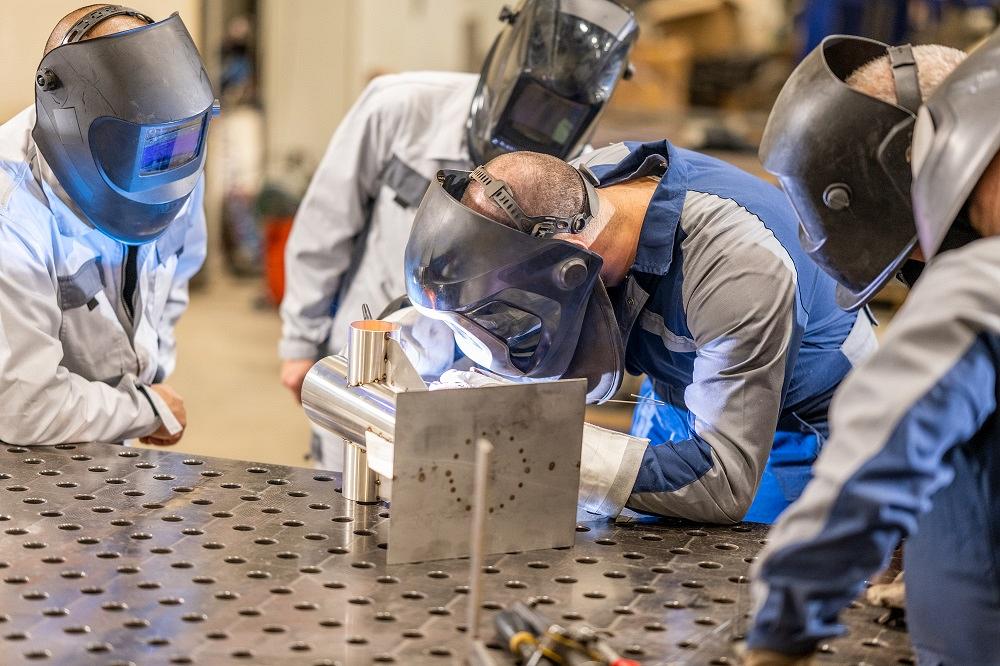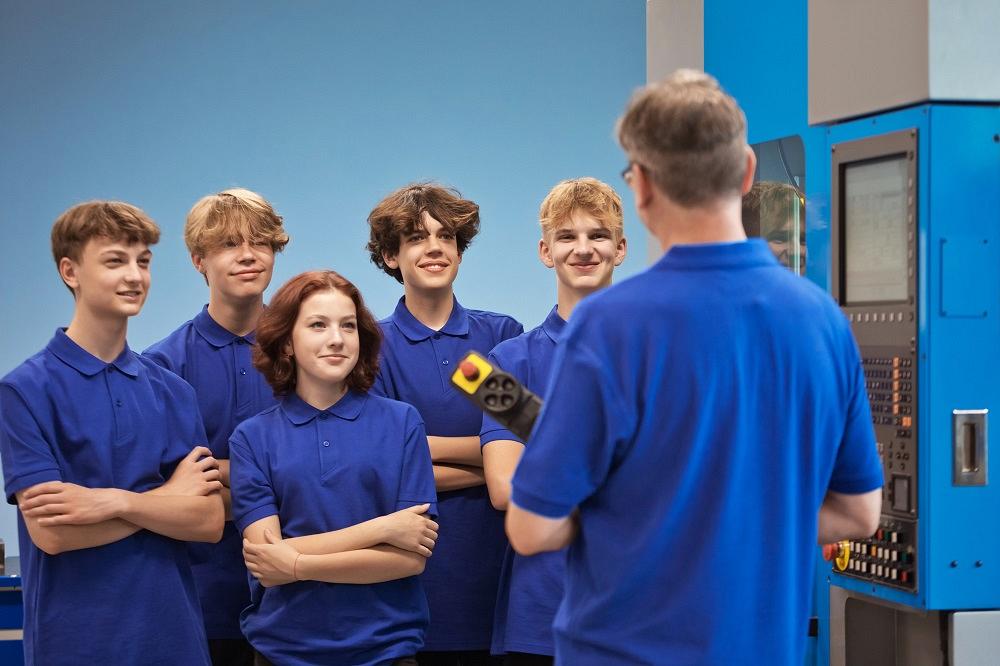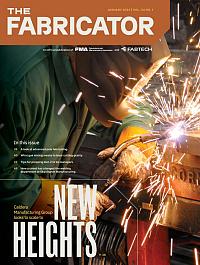Editor-in-Chief
- FMA
- The Fabricator
- FABTECH
- Canadian Metalworking
Categories
- Additive Manufacturing
- Aluminum Welding
- Arc Welding
- Assembly and Joining
- Automation and Robotics
- Bending and Forming
- Consumables
- Cutting and Weld Prep
- Electric Vehicles
- En Español
- Finishing
- Hydroforming
- Laser Cutting
- Laser Welding
- Machining
- Manufacturing Software
- Materials Handling
- Metals/Materials
- Oxyfuel Cutting
- Plasma Cutting
- Power Tools
- Punching and Other Holemaking
- Roll Forming
- Safety
- Sawing
- Shearing
- Shop Management
- Testing and Measuring
- Tube and Pipe Fabrication
- Tube and Pipe Production
- Waterjet Cutting
Industry Directory
Webcasts
Podcasts
FAB 40
Advertise
Subscribe
Account Login
Search
How to entice Gen Z into manufacturing managerial roles
An entire generation of workers remains skeptical about the stress that comes with promotions
- By Dan Davis
- January 7, 2024
- Article
- Shop Management

Generation Z are hands-on learners and like to work in teams. While they might be more demanding in terms of seeking out more flexibility in schedules than previous generations, they still look to be a good fit for modern metal fabricating companies. vm/E+
A story about Gen Zers turning down promotional opportunities that appeared on the Business Insider website in early November generated quite a buzz in LinkedIn feeds, which kind of makes sense because that’s where the older generations hang out to complain about anyone younger than them.
The article “Gen Zers are saying 'no thanks' to promotions for reasons that go beyond money” brought up a decent point, particularly for those industries like metal fabricating that are looking for younger workers to grow with them and ultimately replace the baby boomers and Gen Xers that are thinking about retirement. How do companies entice those born between 1996 and 2009 to take on managerial roles when they are looking for more than a simple bump in pay? They need to change their thinking because they are dealing with a generation that doesn’t think like that.
“Boomers and Gen Xers are really the last generations of an industrial era mindset, meaning that they grew up during a time when things were structured and process oriented. There was a hierarchy dictating how we work and how we team-build,” said Sarah Sladek, a generational researcher and founder of XYZ University. “You pay your dues, and you earn your way up the ladder.”
Let’s just say that Gen Zers aren’t buying that. The first generation of the 21st century is wary of giving up valuable time and taking on more stress for the sake of an increase in compensation. They want to ensure they are making a move that is good for them and fits into the lifestyle that they want to have.
Here are seven tips that might help to entice a Gen Zer to take on more responsibility in your company.
While not solely motivated by money, Gen Z has an interest in finances.
Remember that this is the generation that’s grown up in the aftermath of the Great Recession. They won’t sell their soul solely for money, but they do recognize that steady finances will fund their desire to travel and take on new experiences.
They also are the generation that was pressured to obtain skills, not just a college diploma. They likely don’t have the debt that a lot of millennials have coming out of school.
“When I was younger, I’d take the job no matter what, and I would run through a brick wall for that extra compensation,” said Lisa Wertzbaugher, co-owner of Wertzbaugher Services, West Liberty, Iowa, and author of the Executive Perspectives column in The Tube and Pipe Journal, The Fabricator’s sister publication. “That’s not necessarily the case with Generation Z.”
Wertzbaugher Services now employs at least four Gen Zers in its 10-person workforce. Wertzbaugher said that the newcomers have energized the shop and helped to contribute to the company’s growth. But the company also has stepped up with tuition reimbursement and flexibility in hours to accommodate the realities of working with these young people.
2. Gen Z wants a company to take an interest in them.
Sladek said that Generation Z has grown up during the “most disruptive decade” in history. This generation has come of age with mass shootings being commonplace and the pandemic shutting the world down. They have demands of which previous generations probably weren’t even aware.

These young faces might remind Gen X and baby boomers of themselves, but they think a lot differently about work. With that in mind, manufacturing companies will need to be open-minded if they expect Gen Z to join their managerial ranks. izusek/E+
No one ever heard of baby boomers needing a mental health day, but that’s not going to be an unusual topic of conversation in a workplace with Generation Z. They want an organization that shares a concern for their well-being.
“They’re holding companies to a higher standard than previous generations,” Sladek said.
Wertzbaugher said that her company’s first Gen Z hire, a former high school worker, has taken on the role of managing some of their latest Gen Z hires. With his new role, she had him tag along on a visit to Sable Metal Fabrication Inc., Markham, Ont., recently so that he could get a feel for how another fabricator conducts business. (Wertzbaugher Services is in a user’s group, comprised of similar-sized shops, like Sable Metal Fabrication, that is organized by the Fabricators and Manufacturers Association. For more information on possibly joining such a group, call FMA at 815-399-8700.) Wertzbaugher also said that she plans for the young man to join her at the FMA Annual Meeting, Feb. 27-29, in Clearwater Beach, Fla.
“What’s the true cost of turnover if people leave?” she asked. “If it only costs us the price of a few airplane tickets to get him these experiences, that’s worth it.”
3. Gen Z likes to work in teams.
“Being a part of a team is going to be very important to them. It’ll be kind of a support network,” Sladek said.
That’s where that traditional hierarchy just won’t work for Generation Z. “Do as I say” isn’t the approach you want to take with these young people.
Wertzbaugher said she has seen this with her Gen Z employees as they work on projects simultaneously. Working in pairs on two separate jobs, they create an environment that showcases their collegiality and helpfulness. They switch off on welding activities to avoid drudgery, and their friendly competitiveness drives productivity.
4. Gen Z likes accountability.
Generation Z is the first generation to grow up with social media. In fact, you could argue that they were thrown into social media, with no real guidance or research to see how it might affect them. At the very least, we know that this generation is OK with sharing information.
Companies know their likes and dislikes based on shopping and web-search history. Their smartphones track their steps. Parents—and just about anyone else—can track their whereabouts through those same smartphones.
With that in mind, Gen Z doesn’t mind being held accountable for their jobs. Actually, any type of visual dashboard that allows them to track progress is something that they would welcome, according to Sladek.
“They are the first generation to be raised with things like apps and technology being used heavily in the classroom. They’re used to being able to log in at any time to see their grades or to see how they’ve done on a certain project,” Sladek added. “They’re constantly measuring themselves.”
5. Gen Z doesn’t want to manage from behind a desk.
To say Gen Z is different is an understatement. Sladek said that research studies have started to emerge concluding that Gen Z brains have developed differently than previous generations because of the early exposure to technology. Certain sections of their brains have developed more rapidly than previous generations.
This has resulted in a generation of extreme visual learners. Having them sit down for a lecture isn’t going to cut it. They need hands-on engagement. This approach is a benefit for those that might want to pursue a career in the metal fabricating industry.
“They excel at troubleshooting. They excel at literally jumping into a situation and figuring it out,” Sladek said. “And we use the term hack kind of lightly, but that’s what they do. They love to problem-solve.”
Wertzbaugher said that she has seen her Gen Z manager demonstrate great proficiency at showing the newer workers the ropes. He’s extroverted and very comfortable with these types of interactions, whereas her husband is a product of a generation that was told to figure out things himself, she said.
6. Gen Z wants no part of a negative work environment.
Workers bad-mouthing the company and co-workers constantly, competitive environments that don’t celebrate everyone’s efforts, and managers that minimize employees’ voices—all are examples of a toxic work environment where Gen Z will shut down. They are sick of negativity and view conflict as something for which they don’t have time.
“In comparison to other generations, they’ve been raised in a very different way. They’ve been reliant on technology and building networks that way,” Sladek said. “But when it really maters to them, they want to be face-to-face. They want those close connections and friendships.”
Companies with a cultural problem already have an uphill battle in terms of maximizing productivity. It might be near impossible for those same companies to recruit and promote Generation Z workers without some sort of extreme cultural change.
7. While it might sound sappy to some, Gen Z wants to make a difference.
Sladek recalled a conversation she had with an employer who recounted an interview with a Gen Z applicant that left him almost speechless. The applicant asked, “What’s your company’s stance on climate change, and what is your company doing about it?” The interviewer replied, “Well, this job isn’t even about that. You’re not interviewing for a job dealing with the environment.” The applicant responded, “This isn’t the job for me.”
Gen Z see themselves as part of a worldwide community, and they like the idea of working to make the world a better place. While most metal fabricating companies don’t have formal policies regarding their impact on the environment, the fact that they work with metals that can be recycled and used again is a powerful statement.
Also, a lot of companies already are involved in some sort of philanthropy in their local communities. Expanding those efforts is something that likely will catch the attention of Gen Z workers trying to decide if they might want to take on new responsibilities and extend their stay with their companies.
Celebrating Gen Z’s Contributions
Wertzbaugher Services is already planning for an expansion and the addition of key pieces of capital equipment, such as a laser cutting machine. Growth has been swift in recent years, and she credits the presence of her younger workers as being a major reason why they’ve been able to stay profitable in the face of these new economic opportunities.
“We wouldn’t be where we are today without them,” she said.
Her kids like being around the Gen Zers as well, especially her middle schooler son. She said he actually likes hanging around the young men in the shop because they like to show him what they’re up to and include him on some activities.
If Gen Z is a magnet for the next generation to get involved in manufacturing, that might be the best reason of all to do what you can to get them involved in the managerial ranks.
About the Author

Dan Davis
2135 Point Blvd.
Elgin, IL 60123
815-227-8281
Dan Davis is editor-in-chief of The Fabricator, the industry's most widely circulated metal fabricating magazine, and its sister publications, The Tube & Pipe Journal and The Welder. He has been with the publications since April 2002.
Related Companies
subscribe now

The Fabricator is North America's leading magazine for the metal forming and fabricating industry. The magazine delivers the news, technical articles, and case histories that enable fabricators to do their jobs more efficiently. The Fabricator has served the industry since 1970.
start your free subscription- Stay connected from anywhere

Easily access valuable industry resources now with full access to the digital edition of The Fabricator.

Easily access valuable industry resources now with full access to the digital edition of The Welder.

Easily access valuable industry resources now with full access to the digital edition of The Tube and Pipe Journal.
- Podcasting
- Podcast:
- The Fabricator Podcast
- Published:
- 04/16/2024
- Running Time:
- 63:29
In this episode of The Fabricator Podcast, Caleb Chamberlain, co-founder and CEO of OSH Cut, discusses his company’s...
- Trending Articles
Tips for creating sheet metal tubes with perforations

Are two heads better than one in fiber laser cutting?

Supporting the metal fabricating industry through FMA

JM Steel triples capacity for solar energy projects at Pennsylvania facility

Omco Solar opens second Alabama manufacturing facility

- Industry Events
16th Annual Safety Conference
- April 30 - May 1, 2024
- Elgin,
Pipe and Tube Conference
- May 21 - 22, 2024
- Omaha, NE
World-Class Roll Forming Workshop
- June 5 - 6, 2024
- Louisville, KY
Advanced Laser Application Workshop
- June 25 - 27, 2024
- Novi, MI


























